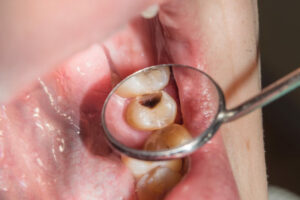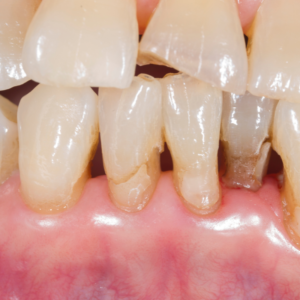Oral Health Concerns for Older Adults
Over the last 80 years, average life expectancy has increased dramatically due to advancements in medical technology. By 2030, the last of the Baby Boomers will turn 65, and older individuals will account for 20% of our population1. While this longevity is positive, it also presents new challenges as we age.
Let’s explore some oral health concerns for older individuals and provide tips for improving oral health in this population.
Dry Mouth
Xerostomia, better known as dry mouth, is a common condition affecting many people, especially the elderly. Numerous medications can cause dry mouth as a side effect, as can radiation to the neck and head area2. Dry mouth becomes problematic because less saliva leads to a more acidic oral environment, where tooth decay advances rapidly.
Protect Your Teeth – Oral Care Tips
Several products are available to moisten the mouth, such as Colgate Hydris, Biotene, and Xylimelts. While these products help ease the sensation of dry mouth, additional measures are needed to protect your teeth. Increasing fluoride exposure is commonly recommended. Depending on other risk factors, we may suggest a prescription fluoride toothpaste or custom fluoride trays to strengthen your enamel and make it more resistant to decay.

Root Decay
As we age, gum recession becomes more common. The majority of the population has some degree of gum recession, which can worsen over time3. Recession exposes the roots of the teeth, which are covered in dentin rather than enamel. Dentin is much softer than enamel, so decay on root surfaces progresses more quickly than on the crown of the tooth.
To combat root decay, we recommend fluoride treatments and discussing your home care routine with your hygienist. Removing plaque at the gumline is crucial for preventing decay and slowing the progression of recession.
Limited Dexterity
Certain diseases such as Arthritis, Multiple Sclerosis, and Parkinson’s can affect our ability to brush and floss effectively. Even general muscle weakness can decrease our effectiveness. To address this issue, we suggest using a brush with a large handle or an electric toothbrush. Flossers with long handles are also available for hard-to-reach areas.

Cognitive Limitations
As we age, our risk for dementia and other cognitive conditions increases. With the progression of dementia, oral care eventually falls to the caretaker. It’s important for caregivers to know how to best care for a patient’s oral health when they can no longer understand or do it themselves.
In Conclusion
While we cannot prevent aging, we can prepare ourselves to deal with the changes that come with it. If you have any questions about the problems or recommendations discussed, please don’t hesitate to ask. We’re always here to assist you with your oral home care needs.
References
Institute on Aging: https://www.ioaging.org/aging-in-america
A Place for Mom: https://www.aplaceformom.com/blog/1-18-16-reasons-senior-dental-health-care-is-important/
Tooth Wisdom: https://www.toothwisdom.org/a-z/article/providing-daily-mouth-care-for-loved-ones/
American Dental Association: https://www.ada.org/en/member-center/oral-health-topics/aging-and-dental-health

